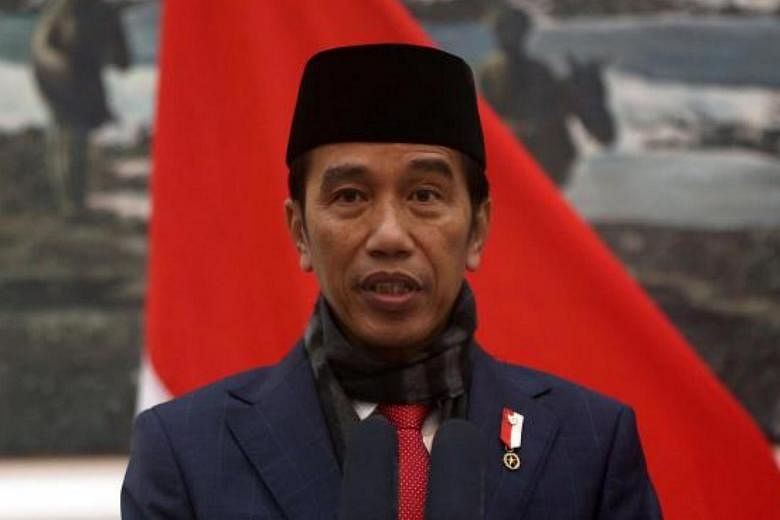JAKARTA (THE JAKARTA POST/ASIA NEWS NETWORK) - What would President Joko "Jokowi" Widodo do if he took on the role of a journalist?
He is likely to ask difficult questions. Mr Joko finds that he himself often has to deal with situations where dozens of journalists ambush him with unexpected questions.
In between his speech to commemorate 2018 National Press Day in Padang, West Sumatra, Joko told the audience that he could face up to 90 journalists in such sudden interviews, during which they take turns to ask him questions, sometimes catching him off guard.
"There is always more than one question, and those questions are all difficult to answer because they (the journalists) pose the questions directly, and it often happens when we are not yet ready (to respond)," Joko said on Friday (Feb 9).
Shortly after he spoke, he suddenly called a journalist to take the stage. Yousri Nur Raja Agam, a senior journalist from Surabaya, East Java, volunteered for a "journalist versus president" game with Joko.
"Sir, you have 34 ministers (in the Cabinet). Which one of them is the most important to you?" Joko, taking on the role of a journalist, asked Yousri.
"They are all important, but what matters more is a minister who can make the president feel comfortable," said Yousri, playing the role of president.
Joko seemed unsatisfied with such a "diplomatic" response.
"So, which minister is the most important? Please be to the point, sir. Don't beat around the bush. I cannot yet write (any news). It (the answer) is still unclear," he said.
The President's skit immediately drew laughter from the audience. Joko later awarded Yousri with a bicycle.
Since taking office in late 2014, this was the third annual press day - which falls on Feb 9 - celebration Joko has attended.
The President said in his speech that although the growing social media platforms in recent years have served as a challenge for the mainstream media, the function of the press as the fourth pillar of democracy remained intact.
"I believe that in an era where information and misinformation spread rapidly, the role of the press is becoming more important as a pillar that disseminates truth and facts, and delivers the aspirations of the public," Joko said.
In its 2017 list, the Freedom House classified the state of press freedom in Indonesia as "partially free", arguing that although the media in the country is generally free from government's control, the private media belonging to "politically connected owners" tended to serve the owners' interests.
Indonesian Press Council chairman Yosef Adi Prasetyo said impartiality of some media, as shown on the days surrounding the 2014 election, would likely reappear during the days leading up to the 2018 regional elections and the 2019 general election.
"(The elections) will serve as a test to find out whether they function (independently) or instead get involved in political interests," he said.
On Thursday, Joko visited the house and birthplace of the late Djamaludin Adinegoro, who pioneered the national press and Indonesian literature, in Talawi, Sawahlunto city, West Sumatra.
Joko, handing over the certificate of the 2.4sqm land belonging to Adinegoro's family, expressed support of the plan to build Adinegoro Museum to preserve the legacy of the journalist and writer, who was also the man behind Indonesia's first atlas.
"We hope the museum can provide educational benefits as well as development of the press in Indonesia," said Adinegoro's grandson Medrial Alamsah.

